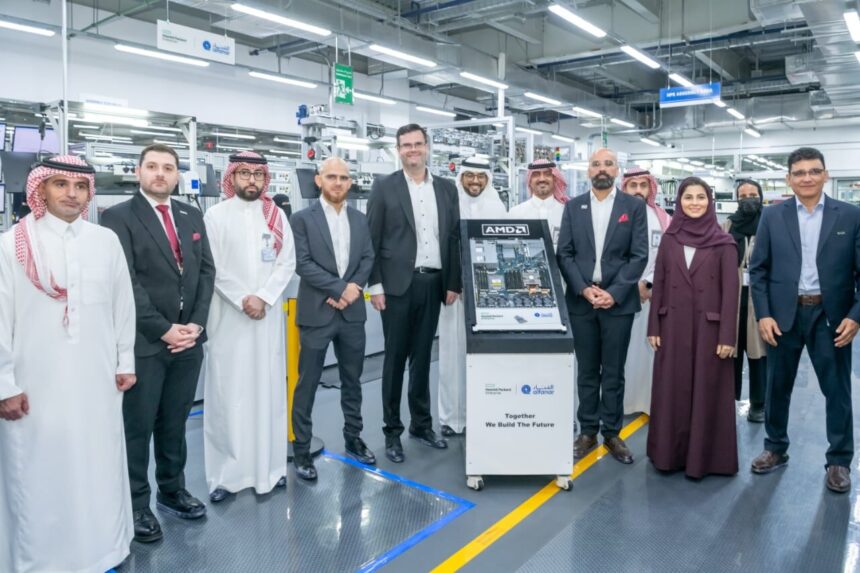HPE has added two new ‘Saudi Made’ ProLiant servers to its line: the DL365 Gen11 and DL385 Gen11. Both use AMD EPYC processors and are built at the Alfanar site in Riyadh. The first AMD CPU-powered unit has already rolled off that line. The systems target data analytics and high-volume workloads and are available across Saudi Arabia, Jordan, Egypt and the Gulf, which includes the UAE.
What’s new
HPE is growing its local server portfolio with two AMD-based ProLiant models produced in the Kingdom.
- Two models: ProLiant DL365 Gen11 and DL385 Gen11
- Built at Alfanar’s Riyadh facility
- First AMD CPU-powered server from the new line
- Focus on speed, security and data analytics
The announcement confirms an expanded ‘Saudi Made’ compute range and marks the first AMD-powered server completed at Alfanar’s production site. HPE says the line aims to deliver predictable performance and robust security for Middle East customers scaling AI and analytics.
Platform and CPU options
The servers support 5th Gen AMD EPYC, with options spanning both 4th and 5th Gen parts, depending on the configuration.
- 5th Gen AMD EPYC support
- High core counts and frequencies
- Large memory footprints for analytics and data processing
- Flexible storage configurations
HPE states that these CPU architectures offer high core density and memory scalability, which enables real-time insights and supports heavier workloads. Storage is configurable, providing IT teams with levers for adjusting throughput and capacity based on use cases.
Availability in the UAE and the region
The updated range is now available in Saudi Arabia, Jordan, Egypt, and the Gulf countries. That includes the UAE. Pricing was not disclosed in the announcement.
- Immediate regional availability
- UAE included in the Gulf distribution
- Carries the ‘Saudi Tech’ logo
- No pricing shared yet
For UAE buyers, the message is clear: orders can be placed as part of the regional rollout. The units carry the ‘Saudi Tech’ mark, signalling local production. If you require exact pricing for the UAE, please get in touch with your channel partner, as HPE has not published figures for this region.
Why it matters for Middle East IT
Compute demand in the region continues to rise, driven by national programmes and the adoption of AI. Local build and supply help with lead times and compliance.
- Supports data-driven initiatives aligned to Vision 2030
- Targets faster analytics and improved operational efficiency
- Designed to provide consistent performance at scale
- Emphasis on security across the stack
HPE frames the move as support for Saudi Arabia’s plan to develop a data-driven economy, citing strong demand for robust infrastructure. The company positions the DL365 and DL385 as secure, high-performance building blocks for AI and analytics projects across the region, including the UAE.
Partnership and skills
The release highlights joint work between HPE, AMD and Alfanar, plus a training track for local talent.
- Collaboration across HPE, AMD and Alfanar
- Skills programmes tied to the expanded line
- Focus on upskilling a majority-female Saudi workforce
- Public statements from AMD and Alfanar leadership
AMD highlights the efficiency and performance leadership of EPYC, aligning with Saudi Arabia’s digital goals. HPE and AMD also plan new training programmes to build skills within a majority-female workforce. Alfanar underlines its role in strengthening production capabilities and talent development in the Kingdom.
What this means for buyers
For CIOs and admins in the UAE and wider GCC, this is about more choice and shorter supply chains.
- More x86 options in the region with AMD EPYC
- Configurable storage and memory for analytics and VMs
- Local assembly can help reduce logistics friction
- Vendor training can ease deployment and ops
If you’re running data-heavy apps, EPYC’s core counts and memory bandwidth are the headline. Pair that with local assembly and skills programmes, and you get a more practical path to scale, especially if your projects are time-sensitive.
FAQs
Which models are part of the new ‘Saudi Made’ expansion?
HPE ProLiant DL365 Gen11 and DL385 Gen11, both powered by AMD EPYC processors.
Is the UAE included in the availability?
Yes. HPE lists Saudi Arabia, Jordan, Egypt and the Gulf countries, which include the UAE.
What are the key technical highlights?
Support for 4th and 5th Gen AMD EPYC CPUs, high core counts and frequencies, large memory footprints and flexible storage options for analytics-heavy workloads.























